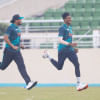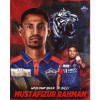‘Coaches should not compromise with raw pace’

Nahid Rana stunned the cricketing world with his raw pace during Bangladesh's historic 2-0 Test series triumph over hosts Pakistan, clocking over 150 kmph while also claiming his career-best figures in the second Test. Even though Bangladesh cricket has been reaping the benefits of forming a potent pace group across formats in recent years, the factors behind the emergence of talented quicks have not been focused on a large scale.
The Test series triumph against Pakistan in Rawalpindi would not have materialised if pacers like Hasan Mahmud, Nahid, Shoriful Islam, and Taskin Ahmed had not outshone the quicks of Pakistan -- a country historically known as the 'land of pacers'. What comes as a hopeful sign for fans and a sweet headache for the team management is that these four aforementioned pacers are not the only ones available in the Tigers' pace tank. Khaled Ahmed, who was also part of this Pakistan series, Ebadot Hossain, currently rehabilitating from an ACL injury that saw him out of action for more than a year, and white-ball regulars Tanzim Hasan Sakib and Mustafizur Rahman are all part of the Tigers' current pace battery.
While they gel together in the national team under the guidance of foreign coaches, the story of their emergence began under local coaches to whom they turn to whenever needed. In this special issue of The Daily Star Sports, we look at one such local coach, Alamgir Kabir, and one of his disciples, Nahid, who came to the fore through the recent Pakistan series. The Daily Star's Samsul Arefin Khan reached out to Alamgir, and the excerpts of his interview are provided below:
The Daily Star (DS): Your students, Nahid Rana and Shoriful Islam, have done exceptionally well during Bangladesh's maiden Test series win over Pakistan. How satisfying is that for you?
Alamgir Kabir (AK): It's obviously a great feeling. When your children do well, as a guardian, you obviously feel well. When I see them doing well for Bangladesh, happiness comes automatically. I hope that they will serve Bangladesh cricket for a long time and remain injury-free.
DS: Can you enlighten us regarding Nahid as you were his direct coach at Clemon Cricket Academy?
AK: I found him at Clemon Rajshahi Cricket Academy when he got admitted all by himself. We have eight to nine coaches and there are few groups. He was initially in a different group. We arranged taped-tennis matches for the players and they played these matches divided into groups.
While playing in such a match, we needed a bowler, where he was picked. My first impression of him was that he was bowling too fast with a taped-tennis ball. I asked him whether he could bowl fast only with a taped-tennis ball or with a cricket ball as well. He replied in the affirmative. He bowled so fast that the wicketkeeper missed all his first five deliveries. I heard that he was in Group C and then I told everyone that he will be in Group A next week. His journey started from there. His bowling action and run-up were different at that time. Now he bowls with a good action but at an early stage, he had a peculiar bowling action while releasing the ball. I had to work on these at that time. As he was under-18 at that time, I told him that I would look after him in the next two years. Then we started working together and worked on his bowling and also showed him different bowling videos, so that he didn't have to struggle when he went to a senior level.
DS: Do you think the change in his action helped him increase his pace?
AK: When I worked on his accelerator, his pace decreased drastically. I told him not to worry about it and work for six months with the new action as it would get adjusted to the muscle. His muscles and bones were growing at that time and day by day he started to grow stronger. I hope his pace will increase in the coming days as well. He is still a young kid and his muscles will improve and the bones will get stronger further.
DS: We know local coaches contribute massively in preparing players for the national-team level, where some might do well instantly. But often those players fail to deliver similar performances consistently. How do you see that in case of Nahid Rana?
AK: As Shoriful Islam [another student of Clemon Cricket Academy] had already played for the U-19, A team and national team by the time, he gave us the updated details that helped me groom Nahid well. When he provided me with the details or sent me videos, I instantly showed him those and told him to be in touch with Shoriful. If Nahid didn't understand sometime, I was there to help him out. He is always willing to learn and I continue to give him guidance.
DS: You have been in coaching profession for a long time. How do you see the interest growing in players to become a genuine fast bowler?
AK: We get many pace bowlers in district and divisional level matches. When we do the selection, we count more on their performances. If we don't analyse someone's performance only but also focus on their pace, I think we would find more players for the highest level. I believe coaches should not compromise with raw pace. If someone wants, they can correct line and length but can't increase pace. We lose a lot of pace bowlers at the screening stage. Whoever is in the selection team should not consider results but also focus on merit in deciding who can deliver at the top level.
DS: Recently the BCB increased salaries of coaches who are working under the Game Development. Do you think the raise is sufficient?
AK: If you are not given enough remuneration in your job, you can't give full concentration. You will definitely look for other avenues of income. So, the focus on your job becomes 50-50. The district coaches want to work properly, but due to their financial situation, they have to work at different academies. In my home district in Chapainawabganj, I have a mango-selling business in the mango season while I also sell paddy during harvesting season. My question is why I should think about such things if I earn decent money from coaching. So you can understand how much remuneration we are getting. I want to take cricket to a new high but at the same time, I have to give attention to my financial well-being.
The kind of salary that they have increased is okay. But if you consider the inflation and cost of living since when I joined till now, is minimal. As a former national team player, the kind of remuneration I get as a district-level coach, I will say is zero. Since I love cricket and want new players to be in a good place, I'm still doing it for the sake of cricket.
DS: Haven't you and your colleagues, as coaches, raised your voices regarding remuneration?
AK: I have spoken personally about the issue. Khaled Mahmud Sujon, our Game Development chairman, asked us about our expected salaries in a meeting six or seven years ago. Among all coaches, I raised my hand and said about 40 to 50 thousand taka should be the salary for district-level coaches in order to ensure our full concentration. He promised that he would raise the issue in the board meeting.
Whenever a meeting has been arranged, we have raised our voices. It's only Sujon bhai who can say why we still don't get the amount that we had suggested. Now it's my 10th year in coaching at the board but still I don't get such amount.
DS: Do you see any similarity between your current salary and what you suggested six or seven years ago?
AK: Actually, no. It is probably half of what we had expected.
DS: What is the biggest regret among the local coaches like you?
AK: We often don't get the proper respect. We do the scouting, coach the players and do all the hard work but all the credit goes to the top-level coaches. We often hear that these players do well during this or that foreign coach's tenure. But where do the foreign coaches get the product? Do they know players from the district-level? We are not paid well and we are not recognised for our work, so where will we get the motivation to work?
**Alamgir Kabir is a former Bangladesh seamer who played three Tests for the Tigers. He is currently working as a district coach (Chapainawabganj) under BCB Game Development. The 43-year-old is currently also working at PKSP and previously worked at Clemon Cricket Academy in Rajshahi.

 For all latest news, follow The Daily Star's Google News channel.
For all latest news, follow The Daily Star's Google News channel. 









Comments